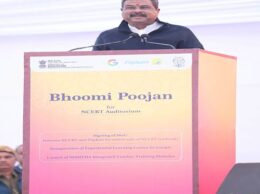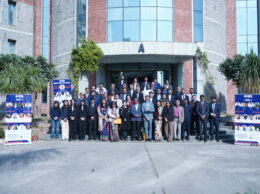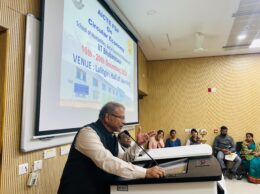JODHPUR : Indian Institute of Technology Jodhpur commemorates 15 years of excellence as it completes its crystal year on 02 August 2023 – a momentous milestone in its journey of shaping young minds. Throughout the decade and a half, the Indian Institute of Technology Jodhpur (IITJ) has solidified its position as one of the most distinguished seats of learning in the nation.
Over the years, IITJ has made significant strides in research and innovation, leaving an indelible mark on the academic landscape of the country.
The Indian Institute of Technology Jodhpur has undergone a remarkable academic transformation since 2019, witnessing exponential growth in its program offerings. From merely 4 undergraduate and 17 postgraduate programs in the academic year 2018-19, the institute now proudly presents 8 B.Tech. and 2 B.S. programs, 25 Master’s programs encompassing M.Sc., M.Tech., MBA, and M.Des., 3 unique M.Sc.-M.Tech. dual degree programs, 7 M.S. by research programs, 2 Master’s and Master’s-Ph.D. programs, and an impressive count of 38 M.Tech.-Ph.D. and Ph.D. programs across all academic units. This expansion exemplifies the institute’s dedication to becoming an institute of national importance and staying attuned to the changing demands of the educational landscape.
Let’s take a look at the 15 years of timeline of IIT Jodhpur mentioned as below:
- The first academic session at IIT Jodhpur began in August 2008.
- The final approval for IITJ’s location near Jodhpur came in November 2009.
- IITJ’s campus covers 900+ acres of land around Jhipasni and Gharao villages, located about 12 km from Jodhpur city on National Highway 65.
- In 2010, three Centers of Excellence (CoE) were established, focusing on Energy, Information and Computer Technology, and System Science, offering M.Tech. and PhD programs.
- In 2012, IIT Jodhpur established five Centers of Excellence, including ones in Biologically-inspired Systems Science and Art, Culture, and Heritage.
- The groundbreaking ceremony for IITJ’s permanent campus at Karwar Village took place on 2 May 2014.
- In 2015, the institute introduced five new academic programs, including M.Sc. programs in Chemistry, Mathematics, and Physics, and M.Tech. programs in Electrical Engineering and Mechanical Engineering.
- The year 2017 marked significant progress with the completion of most Phase I construction and migration to the new campus.
- In 2019, IITJ revamped its academic programs, offering a diverse range of undergraduate and postgraduate programs.
- The institute started a joint Master’s program, a joint Master’s-Ph.D. dual degree program, and a doctoral program in medical technologies with AIIMS Jodhpur from September 2020.
- The institute established a division of interdisciplinary research, offering unique postgraduate programs in Digital Humanities, Space Science and Technology, Quantum Information and Computation, and more.
- The School of Management and Entrepreneurship began functioning in the academic year 2020-21, offering a Tech-MBA program.
Some special features of the campus design:
- Service tunnel of size 4m x 4 m about 3.1 Km long and network of trenches and sub-trenches to accommodate HVAC, Water supply, Fire-fighting, Data Networking, LV cables, LT cable services etc.
- Double walls with thermal insulation- External walls of all the buildings are double walled with 65 mm XPS thermal insulation board in between for thermal insulation. The terrace is also thermally insulated. This reduces the heat load and saves electrical energy to the extent of 20%.
- Berm- Campus is surrounded by Berms on the South West side of height ~14-15 m to prevent entry of hot winds in buildings during summers. Front Berms have been covered with plants and space below are being utilized for Substation, A.C. Chillers, Services Centre, Bank, Offices, Laboratories, Museum, Activity rooms etc.
- Decentralized Wastewater Treatment System (DWTS) – Using settling tanks for primary treatment and anaerobic treatment through Baffled Wall Reactors and aerobic treatment through planted filter beds as secondary treatment. Recycled water being presently used for Horticulture and planned to be used for both horticulture and for flushing in toilets.
- Rain water Harvesting- All hostels are designed with an underground tank for rainwater harvesting and the surface runoff is collected in natural baori through the network of swales
Implementation of NEP 2020:
The curriculum at IIT Jodhpur has been revised to focus on outcome-driven education and to meet emerging technological challenges. The Office of Executive Education offers specialized executive programs in various fields, catering to the professional development needs of working professionals. The implementation of NEP 2020 has led to the structuring of a core B.Tech. program with an option to pursue additional credits for a minor or specialization add-on to the degree. In alignment with NEP 2020, the institute has introduced the Undergraduate Teaching Assistant scheme to offer special tutorials for academically weak students.
The Joint Academic Programme between AIIMS Jodhpur and the institution offers a diverse range of options for students pursuing their BTech degree. Students have the choice to opt for the traditional BSc in Engineering Science with an exit option after completing 100 credits. Alternatively, they can pursue a B.Tech in Engineering Science with an individualized curriculum tailored to their interests and goals. This unique program also emphasizes the importance of incorporating Indian languages in engineering education, with first-year tutorials being conducted in Hindi. Moreover, the program facilitates seamless transitions between multiple entry-exit points for both PhD and MTech studies, providing students with the flexibility to explore various academic paths.
In addition to the BTech options, the institution has introduced exciting new programs to cater to the evolving demands of the industry and society. These include an MSc in Digital Humanities, MTech in Robotics & Mobility, and PhD programs in cutting-edge fields like Quantum Technology, Smart Health, Internet of Things (IOT), Space Science, and Engineering. To foster interdisciplinarity, the Department of Humanities and Social Sciences has been upgraded to the School of Liberal Arts, offering programs such as MSc in Computational Social Science and MS(R) in AI and Creative Arts with a focus on mixed-media forms. Furthermore, the integration of Ayurveda and Engineering has given rise to the establishment of a Center of Research in AyurTech, supported by the Ayush Ministry. Additionally, the institution has taken a proactive approach to cultivate innovation and entrepreneurship among students. Design thinking projects are incorporated from the very first year, and entrepreneurship is offered as a minor area of study for undergraduates. Moreover, the postgraduate programs are designed to be innovation-driven, aiming for targeted outcomes such as incubation and technology generation. This comprehensive and forward-thinking academic framework equips students with the skills and knowledge necessary to excel in a rapidly evolving world and contribute meaningfully to society.
The Indian Institute of Technology (IIT) Jodhpur has seen significant developments in its various departments over the past 15 years.
- Department of Computer Science and Engineering: Started under the umbrella of Information and Communication Technology in 2008, it became an independent department in 2014. It focuses on research areas such as artificial intelligence, machine learning, computer vision, and more. The department has expanded its infrastructure and faculty strength, growing from 10 members in 2020 to 22 currently.
- Department of Electrical Engineering: Established in 2015, it has seen a rise in student intake and faculty strength. The research areas include 5G communication, signal processing, cyber-physical systems, and more. The department has developed multiple laboratories for practical learning.
- Department of Civil Engineering: Established in 2019-2020, it focuses on sustainability and digitalization of infrastructure. The department offers various research areas, and its faculty strength currently stands at 14 members.
- Department of Mechanical Engineering: Formally established in 2015, it offers state-of-the-art laboratories and focuses on thermo-fluids, manufacturing, and mechanical design research areas.
- Department of Chemical Engineering: Founded in 2020, it aims to produce future-ready chemical engineers. The department has seen steady growth in student admissions and faculty strength.
- Department of Bioscience & Bioengineering: Originally part of the Center for Biologically Inspired System Science (BISS), it became a focus group in 2017 and finally a department in 2022. The department works on bioengineering solutions for healthcare, environment, and interdisciplinary research.
- Department of Mathematics: Established in 2013, it offers various programs in mathematics and data and computational sciences. The department has more than 40 PhD and M.Tech.-PhD students engaged in research.
- School of Management and Entrepreneurship: Started in 2019-20, it offers innovative MBA programs and fosters entrepreneurship education. It is expected to grow with new programs and a Centre of Excellence in IP.
- School of Liberal Arts: Initially formed as the Department of Humanities and Social Sciences in 2015, it transformed into the School of Liberal Arts in 2022. The school offers diverse courses and has introduced the Masters in Computational Social Science program.
- School of Artificial Intelligence & Data Science: Inaugurated in 2020, the school focuses on research, teaching, and training in AI and its applications. It has several Centers of Excellence and high-end laboratory equipment for research activities.
- These departments and schools have significantly contributed to the growth and development of IIT Jodhpur over the years.
The Indian Institute of Technology (IIT) Jodhpur has undergone remarkable growth and transformation over the past 15 years, expanding its academic programs, faculty strength, and research infrastructure across various departments and schools. From cutting-edge research in artificial intelligence, data science, and other emerging fields to fostering interdisciplinary collaboration, the institution has become a beacon of innovation and academic excellence. With a focus on sustainability, digitalization, and addressing real-world challenges, IIT Jodhpur continues to nurture future-ready professionals and pioneers who will play pivotal roles in shaping the technological and societal landscape. As it ventures into new frontiers of knowledge and innovation, the institute remains dedicated to its mission of contributing to India’s development and progress on the global stage.









